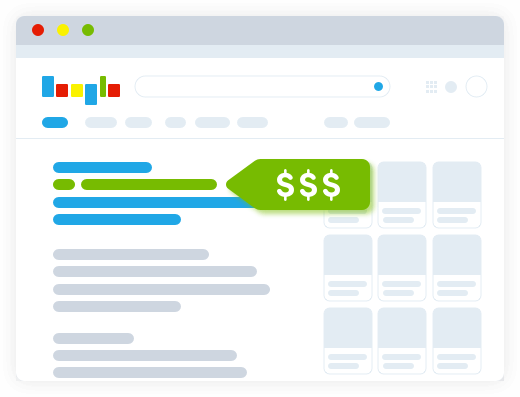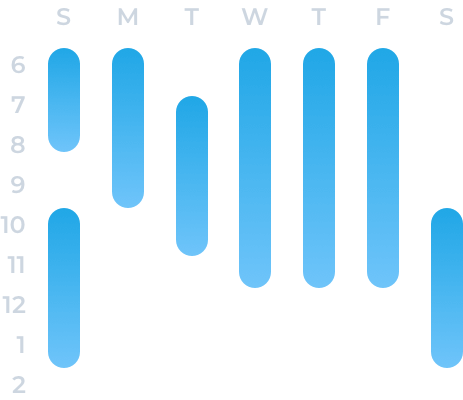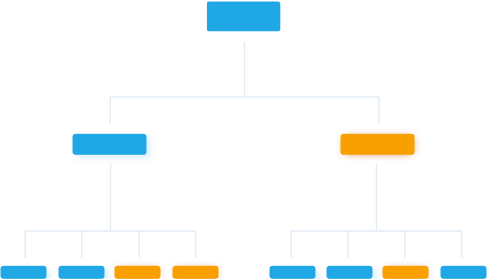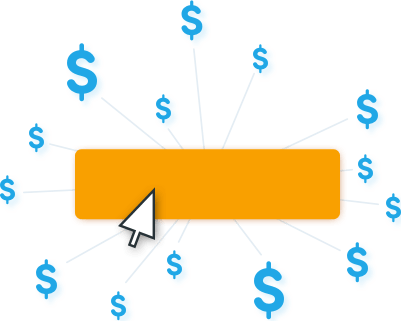PPC Management Services
Everyone knows how important it is to advertise online. Go where the customers are, right? That’s why advertising on Google, specifically, is becoming increasingly popular.
And it’s extremely easy to set up and manage, especially on a high level.
Or is it?
What many people don’t know is just how difficult it is to set up and manage a PPC campaign effectively.
That’s where Searchbloom comes in.
Searchbloom is setting a new standard for PPC management because we treat your campaigns and ad dollars as if they were our own. We are constantly watching your marketplace and making realtime adjustments just as a day trader would trade stocks on your behalf.

Our Partners







What’s Included in Our PPC Management Services
We’re going to break down our technique that guarantees you an ROI you’re comfortable with; because that’s what we’re all about: we won’t bring on a new partner client unless we KNOW we can generate an ROI.
Research & Discovery
Any PPC management professional will tell you that a properly built PPC campaign always starts with comprehensive research and discovery.
Our Analysts leverage Searchbloom’s systematic PPC management process to discover informational, navigational, commercial, transactional, and competitor keywords.
They’ll also look for long-tail or branded keywords so that you can skip the top of funnel targeting and jump straight to the middle and bottom of the funnel. In other words, we find the people who know what they’re looking for and are ready to buy.
And with all of this information in hand, we can construct the perfect strategy for your search and display campaigns.
By analyzing each of your primary competitors, we can see what keywords and ads are working for them.
Why reinvent the wheel if a competitor already has a successful campaign running that we can learn from for FREE?
If your primary competitors are getting a good amount of branded traffic, we may also consider building a competitor campaign to siphon traffic from them and flip them into your customer.
Campaign Structure
Segmentation is the cornerstone of ANY successful digital marketing campaign.
We begin your PPC (Google Ads or Bing Ads) campaign structure like how a contractor would build a home: with the end in mind. Each keyword parity or theme is segmented from the other, so we have a clear direction as to what is working and what is not.
By focusing our efforts on the architecture of your PPC campaigns, adgroups, and keywords, we inherently improve your quality score and ad relevance to ensure you are getting the highest AdRank at the lowest cost per click possible…

BUILDING & OPTIMIZING FOR CONVERSION
Each potential customer that visits your site is at a specific step in their buying journey.
When structuring a Pay Per Click campaign, we segment each section of the digital marketing sales funnel. Doing so allows us to target specific pieces of the buying cycle.
A digital sales funnel generally consists of three parts, each with a specific focus:
- Top of Funnel (TOFU) Building awareness and interest
- Middle of Funnel (MOFU) Driving consideration
- Bottom of Funnel (BOFU) Acquiring and retaining customers
By targeting these distinct areas, we can pinpoint the users who are
most likely to convert at every stage.
That means you spend less and make more.
CAMPAIGN TYPES
There are many different campaign types we leverage when building Pay Per Click accounts. Each campaign type is designed for a different stage in the digital marketing funnel.
For instance, if you are an e-commerce store, then we will likely leverage a shopping campaign – but that’s not a hard and fast rule.
We understand that not all businesses are the same, so we make a proactive effort to collaborate with you to help choose the appropriate PPC campaign types for your business.
Below are a few of the PPC campaign types we regularly leverage, however, this is not an exhaustive list –
- Research
- Branded
- High-Intent
- Top Performers
- Competitor
- RLSA (Remarketing lists for search ads)
- Keywords
- Placements
- Topics
- Demographics
- In-Market Segments
- Affinity Categories
- Remarketing
- Shopping (Product Listing Ads)
- Dynamic Remarketing
- TrueView
- Pre-Roll
- Bumpers
Ad Best Practices
Intent
The structure of your Google Ads account helps you control where your ads appear, when they’re served, and what searches trigger them.
But if you don’t organize your account properly, then you’ll have little to no control over how your ads perform – which is a recipe for disaster.
Searchbloom works meticulously to ensure that each ad is set up in its proper campaign and ad group to ensure easy tracking and improvement.
Keyword Match Types
Keyword match types are how you can tell Googlewhich searches you want your ads to show for. Theoptions are:
- Broad match
- Modified broad match
- Phrase match
- Exact match
Each match type in your account has a different purpose.
If you are targeting the top of the funnel, you may begin with broad or modified broad match types; if you are targeting the middle or bottom of the funnel, you will probably be more focused on phrase and exact match terms.
We’ll help you pinpoint which match types are best,then use them to help your business grow.
Negative Keywords
Negative keywords block traffic that is triggered by your keywords.
But why would you want to block traffic?
Let’s say you sell phone cases, and we are bidding on“phone cases” so we can get people to consider purchasing your product. If a user searches Google for “free phone cases,” then your ad would show without negative keywords.
You wouldn’t want that person clicking on your ad because your product isn’t’ free.
This is a basic example of why we would want to use negative keywords. If someone includes “free” in their search query, our ads do NOT serve.
Ongoing analysis of user search queries and the addition of negative keywords are a part of our PPC campaign optimization process to help ensure your budget is well-spent
Quality Score
Your Quality Score is how Google rates the relevance and quality of your ads, keywords, and overall account.
This is then used to determine your cost per click (CPC), and can dramatically impact the success of your ads.
So because high-quality scores are so vital to the success of the PPC account, we regularly analyze quality scores and structure campaigns with that in mind.
With that in mind, most accounts we service usually have dedicated search, display, and remarketing campaigns that include segmented ad groups with segmented targeting for optimal quality scores.
Ad Extensions
Experienced advertisers will leverage the power of ad extensions to increase click-through rate (CTR) as well as quality score.
As these metrics increase, your CPC decreases which means your cost per acquisition (CPA) also decreases. That’s exactly what you want.
Searchbloom analysts will use all practical ad extensions for your campaigns. Here are a few common ad extensions we frequently employ
- Call Extensions
- Sitelinks Extension
- Callout Extensions
- Location Extensions
- Price Extensions
- Review Extensions
- Structured Snippet Extensions
Budget Allocation
Campaign budget allocation changes often – or at least it should. As we collect data from your campaigns, we’ll change your budget based on what we see.
When one campaign is out-performing another, we expand that campaign and increase its daily budget. At the same time, we remove budget from less profitable campaigns.
Plus, Searchbloom Analysts regularly use forecasting to determine daily budgets for each of your campaigns.
We’ll start with the low hanging fruit, and then optimize your budget from there for maximum effect.
Managing your ad budget is one of the more complicated aspects of PPC marketing.
That’s why many advertisers choose to automate using either the automated bidding option in Google Ads or a third-party bid management solution.
Both approaches have their upsides and downsides.
In our experience, there’s not a one-solutionfits-all approach.
A site making $15/sale with 100 sales a month doesn’t typically need bid automation. A site doing thousands in sales with variable prices and margins needs robust bid automation.
Creative & Ad Optimization
Searchbloom’s Analysts frequently run A/B tests or even multivariate tests to help you lower your CPA and maximize ROI.
Continually testing and making decisions based on data will produce better results month over month. Like a sales organization which touts the phrase “Always be Closing,” one of our internal slogans is “Always be Testing.”

A primary way to optimize your Ad Schedule is called Dayparting.
Dayparting is when you schedule your ad campaigns for certain periods during the day with the goal of optimizing visibility and click-through rates.
For instance, if you get more clicks and purchases between 6-9 PM, dayparting maximizes your budget in that time period. If done correctly, you’ll see more traffic and a higher quality score.
While it may be appropriate to run your campaigns 24/7 every day of the year, it is critically important to modify bids by time of day or day of the week.
With careful analysis, we can adjust bids based on the data we receive so that we are only paying for what a click is truly worth to us.
Depending on your product or service, we will probably want to make bid adjustments based on different devices.
With massive mobile adoption in today’s world, we must take these mobile searches into account and use them to our advantage. We let the data tell us what to do while also implementing the latest best practices.
If for example, you own an e-commerce storefront, then we may start with a negative mobile bid adjustment. This is because e-commerce transactions are less likely on a mobile device – at least for now.
With that being said, perhaps your customers use their mobile devices to buy your products because it is so easy to do so. In that case, we draw on the data to make a more informed decision on mobile and tablet bid adjustments.
The point is, we make the call based on what your data says.


Having a data feed of all your products is just the starting point of creating an effective shopping campaign.
Once you have your feed, you need to segment it down into different product and adgroups and then optimize the product description and title to include the keywords we are targeting. Yes, this is a tedious and time-consuming process but it is required to achieve the best Shopping (product listing ads) results.
Searchbloom regularly partners with feed optimization companies to get your initial feed setup and then we pull it into Google Merchant Center. From there, we spend countless hours segmenting products into their respective ad groups.
By dedicating resources to landing pages or site conversion rate optimization, Searchbloom can save you thousands in wasted ad groups and positively impact conversion rates.
Each of our campaigns includes some form of conversion rate optimization (CRO) best practice.


When developing ad groups, Searchbloom analysts always include multivariate testing.
You may have heard of A/B testing. Multivariate testing takes that one step further.
For instance, in a traditional A/B test you would typically have two ads – each with their own unique selling proposition. These ads would compete, and you proceed based on whichever variant works best.
Multivariate testing introduces more than two unique propositions. We may have three, four, or more ideas that we test at the same time.
Then over time, we follow the data and help you proceed with a clear winner. It’s produced great results in the past, and we make sure that it will work for you too.
CRO Framework
We follow a tried and tested 5-step framework for CRO.
- Company: Goals/Unique Selling Propositions (USP)
- Customer: Objections/Potential Objections
- Website: User experience/Usability sales funnel
- What are you we testing? (e.g., hires images, modified USP, etc.)
- Who are we testing? (e.g., audience 1, audience 2, etc.)
- Where are we testing (e.g., 3 product pages, sales funnel, etc.)
- Addresses Hypotheses On-Brand
- Technically “do-able”
- Correct Segmentation/Targeting?
- Browser/Device Testing
- Statistical significance has been achieved
- Hypotheses were correct (Scale result)
- Hypotheses were NOT correct (What did we learn?)
Campaign Assessment
Many business owners and marketing managers have a fear of hiring a PPC agency/PPC campaign manager who will set up their PPC account, and PPC campaigns then leave it on autopilot.
At Searchbloom, we consistently track campaign data so that we can make sound decisions and find the winning ads. You’ll know what we’re doing, and also know what the plan is going forward to get better and better month over month.
Analytics and tracking is a massive part of pay per click management.
Proper tracking is essential to our success, and we will work with your team to ensure tracking is accurate and up-to-date.
Searchbloom will want to monitor all relevant conversion points, including lead generation forms, newsletter signups, ecommerce transactions, revenue, phone calls, and more.
Tracking and recording inbound calls allows for further insights into your sales funnel.
So if lead generation is your primary goal, then call tracking is something you will certainly want on your radar.
Searchbloom partners with CallRail who is the market leader in call tracking. Each of our analysts is incredibly familiar with the CallRail platform, and you get to reap the benefits.
Reporting & Collaboration

You have experience in your industry and know more about your business and model than we ever could.
Our aim is to leverage your experience and collaborate with you as often as possible by providing regular reports and frequent collaboration calls.
Most of our partners prefer monthly reports and phone calls, while some prefer more frequent reporting and call schedule. We customize the communication between your team and ours to best suit your needs and the needs of the campaign.
If you have questions about pay-per-click management and how it can benefit your business, keep reading!
PPC Management
Frequently Asked Questions
PPC stands for Pay-per-click and is an internet advertising method used to win direct traffic to your website. PPC management is the practice of outsourcing these efforts to an agency or professional who can optimize your ads and maximize your budget.
Google Ads charges you per click on your ad, and the amount your charges varies based on a variety of factors. The average cost per click is between $1 to $2, but some industries are so competitive that you can expect up to $50 per click. Small-to-medium businesses can easily spend thousands of dollars on advertising with good results.
Using any PPC platform, especially Google Ads, will require money and time to optimize. That said, thousands of businesses advertise successfully on this platform, and the average business makes $2 for every $1 they spend on ads. Base your decision on whether or not you think you can get an ROI. If you do the math and it’s clear PPC advertising will not work for your business, consider Local, National, or Ecommerce SEO as a worthwhile alternative to Pay Per Click Marketing.
The viability of pay-per-click depends on your business, product, and a metric called Cost per Acquisition. The average business only completes a sale on 2-10% on their ads, but they still spend money on each click.
You’ll have to balance your cost per acquisition with your hard costs and margin to see if pay-per-click is viable. While there may be guides in your industry that encourage or discourage pay-per-click, the only way to know for sure is to create, optimize, and experiment on your ads.
Pay-per-click is simple in theory. You create an ad and establish a budget through Google’s advertising platform. Google then displays your ad on their Search or Display Network.
Based on the parameters you set, Google will show your ad in their search engine results page when a user searches for certain terms (Search), or in designated areas in the header or sidebar of a page (Display). Google charges you a small fee whenever a user clicks your ad, hence “pay-per-click.”
Google only charges the minimum amount needed to continue serving your ad. They determine the dollar amount based on your industry, how optimized your ad is, and the competitiveness of the search term you’re advertising on.
As a general rule, responsive ads are considered the most effective at driving action no matter which Network you advertise on. These ads can adapt to whatever device your user is on without issue, which means they can click through and covert universally.
The average cost to run an ad on YouTube is between $0.10 to $0.30 per view. That means every time your ad gets shown, you pay a small fee to YouTube (even if the viewer skips the ad).
YouTube also has an independent advertising platform, which means it won’t work through your Google Ads account. However, it’s still possible to run Display ads on YouTube, which may be cheaper and more effective.
Optimizing pay-per-click campaigns takes quite a bit of time, experience and experimentation. If you’re new to online advertising or don’t have time to work with your ads regularly, it’s worth hiring a PPC expert to help you. Ask yourself these questions.





